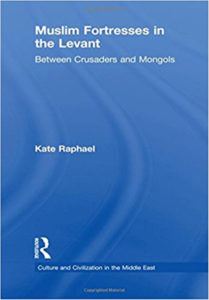
Muslim Fortresses in the Levant: Between Crusaders and Mongols
Kate Raphael
Routledge (2010)
Rs13,112
During much of the twelfth century the Crusaders dominated the military scene in the Levant. The unification of Egypt and Syria by Saladin gradually changed the balance of power, which slowly begun to tilt in favour of the Muslims. This book examines the development and role of Muslim fortresses in the Levant at the time of the Crusaders and the Mongol invasion, situating the study within a broad historical, political and military context.
Exploring the unification of Egypt with a large part of Syria and its effect on the balance of power in the region, Raphael gives a historical overview of the resulting military strategies and construction of fortresses. A detailed architectural analysis is based on a survey of four Ayyubid and eight Mamluk fortresses situated in what are today the modern states of Jordan, Israel, Southern Turkey and Egypt (the Sinai Peninsula). The author then explores the connection between strongholds or military architecture, and the development of siege warfare and technology, and examines the influence of architecture and methods of rule on the concept of defence and the development of fortifications.
Drawing upon excavation reports, field surveys and contemporary Arabic sources, the book provides the Arabic architectural terminology and touches on the difficulties of reading the sources. Detailed maps of the fortresses in the region, the Mongol invasion routes, plans of sites and photographs assist the reader throughout the book, providing an important addition to existing literature in the areas of Medieval Archaeology, Medieval military history and Middle Eastern studies.
Kate Raphael is a postdoctoral researcher in the Department of Earth and Sciences at the Hebrew University of Jerusalem, Israel. She received her PhD in Medieval Islamic studies at the Hebrew University of Jerusalem, and her research currently focuses on environmental disasters in the Medieval Middle East.
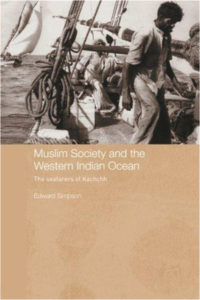
Muslim Society and the Western Indian Ocean: The Seafarers of Kachchh
Edward Simpson
Routledge (2006)
Rs10,653
Based on substantial ethnographic, textual and archival research, this interesting book offers a new perspective on the anthropology of the western Indian Ocean. Writing in a clear, engaging style, and covering an impressive range of theoretical terrain, Simpson critically explores the relationships between people and things that give life to the region and drive shifting patterns of social change among Muslims in the highly-politicized state of Gujarat.
Scholars of the Indian Ocean, Muslim society in South Asia, and Hindu nationalism, as well as anthropologists in general, will find this a fascinating read and a major contribution to research in this area.
Edward Simpson is Lecturer in Anthropology at Goldsmiths College, University of London. He has written on various aspects of both Muslim society and natural disasters in Gujarat, western India.
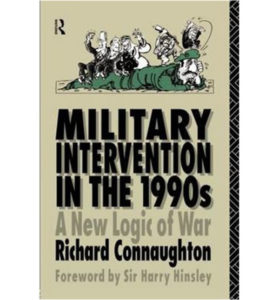
Military intervention in the 1990s: a new logic of war
Richard Connaughton
Routledge (1992)
Rs6,556
By considering the operational factors involved in all types of intervention, and by examining some of the historical precedents for these operations, Richard Connaughton provides a timely interpretation of international affairs.
The concept which lies behind the operational level of war is immensely powerful. It grew directly out of a German philosophical tradition which underpinned the writings of von Moltke and the operation of the German General Staff. It provided the basis for Soviet defensive and offensive operations, when vast bodies of men and material were manoeuvred in unison over great distances, and it has produced a framework within which both the air-land battle and at a different scale, low-intensity warfare can be conceived and executed.
How then will it adapt to the new conditions anticipated in the 1990s and beyond as all the old verities of confrontation unravel? Part of the answer lies in this book. The author has used the events of the Gulf war to place the concept of intervention within an historical context. But he also looks to the future. The central question he suggests, is: can interventions succeed and if so how can a positive outcome be secured.
Richard Connaughton was the British Army’s head of defense studies.
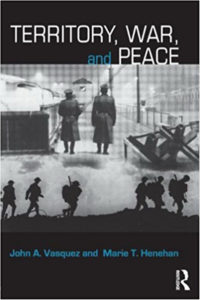
Territory, War, and Peace
John A. Vasquez
Routledge (2010)
Rs16,390
This book presents a collection of new and updated essays on what has come to be known as the territorial explanation of war.
The book argues that a key both to peace and to war lies in understanding the role territory plays as a source of conflict and inter-group violence. Of all the issues that spark conflict, territorial disputes have the highest probability of escalating to war. War, however, is hardly inevitable; much depends on how territorial issues are handled. More importantly, settling territorial disputes and establishing mutually recognized boundaries can produce long periods of peace between neighbors, even if other salient issues arise. While territory is not the only cause of war and wars arise from other issues, territory is one of the main causes of war, and learning how to manage it, can, in principle, eliminate an entire class of wars.
This book will be of great interest to all students of war and conflict studies, causes of war and peace, international security and strategic studies.
John A. Vasquez is Thomas B. Mackie Scholar in International Relations at the University of Illinois, Urbana-Champaign. He is author of The Steps to War (2008) (with Paul Senese) and The War Puzzle Revisited (2009). He has been president of the Peace Science Society (International) and the International Studies Association.
Marie T. Henehan is Director of Internships and Lecturer, Department of Political Science at the University of Illinois, Urbana-Champaign. She is author of Foreign Policy and Congress: An International Relations Perspective and co-editor of The Scientific Study of Peace and War.
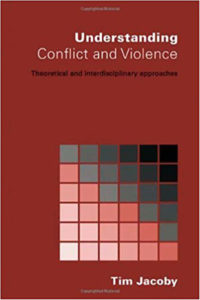
Understanding Conflict and Violence: Theoretical and Interdisciplinary Approaches
Tim Jacoby
Routledge (2007)
Rs11,473
This book examines and interprets a wide range of approaches to the causes of violence and conflict.
The causes of violence and conflict are often left untheorized, or they are discussed as an existent problem assumed to be an inevitable part of human interaction. Adopting an accessible approach, this volume presents readers with a clear understanding of the causes of violence and conflict by highlighting their evolutionary roots and illustrating them with in-depth case studies and examples.
Tim Jacoby addresses the fragmented nature of the literature on conflict theory by drawing upon a wide range of disciplinary traditions, seeking to reflect the fact that international relations, history, economics, development, politics and sociology all share a long-standing interest in the study of conflict and violence and that common concerns make interdisciplinary stimulating and productive.
Reviews: Understanding Conflict & Violence will be of interest to students and scholars across the disciplines of international relations, history, economics, development, politics and sociology.
Hugely informative and stimulating, Tim Jacoby’s writing combines an impressive coverage of diverse theoretical perspectives with a real sense of relevance to current predicaments - a considerable achievement.’ (Paul Rogers, Professor of Peace Studies, Bradford University, UK)
‘This is a superb survey, clearly written and structured, and with an unusual range and historical depth of coverage. This book will become a standard, highly useful resource for all those with an interest in negotiating their way through complex debates and problems in understanding violence and conflict.’ (Christopher Cramer, Professor of the Political Economy of Development, SOAS, UK)
‘The large body of different methodological and theoretical approaches that Jacoby introduces in his volume is remarkable...The book serves as a valuable contribution to development of conflict analysis method and theory.’ (Naima Mouhleb, Security Dialogue)
Tim Jacoby is Senior Lecturer at the Institute for Development Policy and Management at the University of Manchester, UK.

